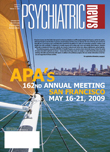A special track of workshops, symposia, and lectures at APA's 2009 annual meeting in May, coordinated by the National Institute on Alcohol Abuse and Alcoholism (NIAAA), will cover topics ranging from how to manage patients with alcohol use disorders in general practice to new treatments being developed.
Several workshops will focus on helping all psychiatrists feel more confident and comfortable screening and treating patients in an office setting for heavy drinking and alcohol dependence. Topics include an overview on pharmacotherapies, managed care issues, and practical guidelines.
General psychiatrists are not screening and treating patients for such problems as aggressively as they should, Mark Willenbring, M.D., director of the Division of Treatment and Recovery Research at NIAAA, told Psychiatric News. He will chair a workshop in this track titled “Helping Patients Who Drink Too Much: Using the NIAAA Clinician's Guide,” scheduled for Thursday, May 21. The session is based on an interactive training guide developed by NIAAA and posted online at<www.niaaa.nih.gov/guide>.
Heavy drinking and alcohol abuse are common comorbidities in patients with psychiatric disorders such as bipolar disorder, depression, and anxiety disorders, Willenbring noted. “General psychiatrists need to get into the business of treating alcohol-related disorders,” he said. Rather than relying on referring patients to addiction psychiatrists, who are in short supply, general psychiatrists can make a big difference by integrating treatment for alcohol use disorders into the overall care.
Several symposia will present the latest clinical and epidemiological research on alcohol-related disorders, with a special focus on comorbidities including posttraumatic stress disorder and attention-deficit/hyperactivity disorder.
Drawing from a wealth of data collected by the National Epidemiologic Survey on Alcohol and Related Conditions (NESARC), the session“ Personality Disorders in the United States: Relationship to Early Experiences, Occurrence, and Course of Axis I Disorders” will focus on the influence of childhood maltreatment and personality disorders on various psychiatric disorders including substance and alcohol use disorders. NESARC, sponsored by NIAAA, is the largest community-based, longitudinal study to date on the characteristics and progression of alcohol use.
Prevention of alcohol use disorders in youth continues to be a focus. The symposium “Understanding and Addressing Adolescent Alcohol Consumption and Alcohol Use Disorders in the Context of Overall Development” will be held Monday, May 18.
Also, the NIAAA track will cover the latest advances in neuroscience and genetics that are revealing the causes and mechanisms of alcohol use disorders, addiction in general, and relapse. Scientists now know far more about the mechanisms involved in addiction and alcohol cravings beyond the traditional reward circuits involving dopamine. These discoveries not only further understanding of the disorders, but also push forward the development of new treatments.
At the annual meeting, renowned researchers will share their insights into the neurochemical mechanisms and treatment targets gleaned from genetic and epigenetic studies. During the symposium “Contribution of Neuroscience to Medication Development for Alcohol Use Disorder,” scheduled for Monday, May 18, scientists will review an array of new molecules that are under hot pursuit by researchers and pharmaceutical companies and may become available in the near future.
“There is so much exciting development in neuroscience, genetics, and epigenetics, which has helped us identify new targets [in the brain] for medication development,” Willenbring commented. He expressed optimism that new drugs, probably new classes of drugs, could enter clinical practice in the near future.
The NIAAA track “is a rich curriculum that nicely combines updates of basic science advances and the more practical sessions people will find immediately useful,” he said.
The NIAAA track schedule will be published in a future issue. ▪
